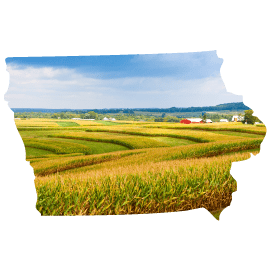Secondary Teacher Preparation in Science:
Iowa
Delivering Well Prepared Teachers Policy
Analysis of Iowa's policies
Iowa offers a general science endorsement; candidates must complete 24 semester hours of coursework that includes biological science, chemistry and physics. Teachers with this license are not limited to teaching general science but rather can teach any of the topical areas. The state also offers a physical science endorsement, which requires 24 semester hours in physical sciences and includes coursework in physics, chemistry and earth science. Regrettably, secondary teachers in Iowa are not required to pass a content test.
Middle school teachers in Iowa must complete a science concentration, which requires 12 semester hours of coursework that includes life science, earth science and physical science. Middle school teachers in Iowa are also not required to pass a content test.
Recommendations for Iowa
Require secondary science teachers to pass tests of content knowledge for each science discipline they intend to teach.
Although coursework plays a key role in teachers' acquisition of content knowledge, it should be accompanied by the requirement of an assessment, which is the only way to ensure that teachers possess adequate knowledge of the subject area.
Require middle school science teachers to pass a test of content knowledge that ensures sufficient knowledge of science.
State response to our analysis
Iowa recognized the factual accuracy of this analysis.
Select another topic
Delivering Well Prepared Teachers
- Admission into Preparation Programs
- Elementary Teacher Preparation
- Elementary Teacher Preparation in Reading Instruction
- Elementary Teacher Preparation in Mathematics
- Middle School Teacher Preparation
- Secondary Teacher Preparation
- Secondary Teacher Preparation in Science
- Secondary Teacher Preparation in Social Studies
- Special Education Teacher Preparation
- Assessing Professional Knowledge
- Student Teaching
- Teacher Preparation Program Accountability
Expanding the Pool of Teachers
Identifying Effective Teachers
- State Data Systems
- Evaluation of Effectiveness
- Frequency of Evaluations
- Tenure
- Licensure Advancement
- Equitable Distribution

